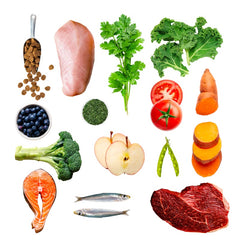Good nutrition is important for the overall health of your pup and plays a huge role in preventing and managing skin conditions in dogs. Many common skin disorders in dogs can actually be improved with diet changes, making it essential to identify the most beneficial type of food for your canine companion.
role in preventing and managing skin conditions in dogs. Many common skin disorders in dogs can actually be improved with diet changes, making it essential to identify the most beneficial type of food for your canine companion.
The skin is a large, metabolically active organ with a high physiologic requirement for protein and other nutrients. It is not surprising, therefore, that subtle changes in its nutrient supply can have a marked effect on skin and coat condition. Dietary factors may play a role in the etiology and therapy of skin disease in three arenas, i.e., nutrient deficiency or imbalance, nutritional supplementation for therapeutic effect and dietary sensitivity.
Understand the Root Cause of Skin Conditions.
Before considering how diet can help manage skin conditions in dogs, it’s important to get an accurate diagnosis from your veterinarian to identify the root cause. Common skin-related disorders in pets are often triggered by food allergies, environmental factors, and even genetic predispositions. Once you understand what is causing the issue, you can start looking into dietary changes that may help reduce symptoms.
The most common skin problems in dogs

- Allergy (including flea-bites and atopic dermatitis)
- Skin cancers
- Bacterial skin infection
- Seborrhea (greasy skin or dry, flaky skin)
- Parasites (e.g., demodectic mange)
- Food hypersensitivity/intolerances
- Immune-medicated skin disease
- Hormone-related skin diseases
Even in dogs not experiencing an adverse reaction to food, the skin and coat can be affected by many nutritional factors.
A nutritional deficiency can have a huge effect on a dog's skin and coat. This often happens when a dog is fed a homemade diet over a long period of time. A nutritional deficiency can also occur when dogs are fed a poor quality commercial dry food, a commercial food that contains nutrient excesses, or if a commercial diet is supplemented inappropriately.
Adjust Your Pet's Diet for Nutritional Balance.
An unbalanced diet can trigger inflammatory responses and worsen skin
conditions in dogs, so it is critical to make sure they are getting all the proper nutrients their bodies require. Choose a complete and balanced food with specific nutrients that can help manage your pet's condition such as omega-3 fatty acids and zinc. You may also want to supplement your pet’s diet with probiotics or special vitamins to help support their overall health.
Evaluate Food Allergens and Eliminate Suspect Ingredients.
When evaluating your dog’s food, look for potential allergens. Common canine skin allergies are typically caused by proteins like chicken, beef, and lamb. Grains such as corn, wheat, soy, and eggs can also be possible triggers of skin reactions. If you think your dog may have an allergy or intolerances to certain foods, consult your veterinarian to discuss alternative meal options that are free of suspect ingredients.
Monitor Vitamin and Mineral Intake for Different Pets Types.
Dogs are individuals and require different nutritional needs depending on their life stage, genetic makeup, lifestyle and even the climate in which they are living. If you’re working to improve a skin condition in your dog, make sure not to over supplement since excess vitamins can lead to serious health issues. Monitor your pet’s vitamin and mineral levels according to their specific individual needs. For example, puppies need higher levels of calcium and pregnant dogs need more choline. Talk with your veterinarian to determine what vitamin requirements work best for your four-legged friend.
Create a Well-Rounded Diet to Address Skin Issues in Dogs.
Food-related risk factors for nutrition-related skin disease include:
- Low-fat content
- Poor-quality protein or fat
- Low nutrient digestibility
A balanced diet rich in essential fatty acids, antioxidant fruits and vegetables, and complete protein sources can help keep your dog’s skin healthy. Man's Best Grain-Free Dog Food range supports skin health. For optimum nutrition and a formula rich in Omega oils we recommend feeding the Man's Best Ocean Fish Adult formula. Adding probiotics to their diet can also improve their skin condition by aiding digestion. Consider adding supplements such as omega-3 supplements and vitamin E to alleviate the symptoms of dryness, redness, itching and other common skin issues. Additionally, consider avoiding certain ingredients commonly found in pet foods like food coloring agents, sugar, artificial sweeteners, preservatives and fillers that may be exacerbating your pet's skin conditions.
Evidence suggests a close relationship between nutrition and healthy skin and haircoat in dogs. Nutrition for optimal health, wellness, and skin and haircoat quality is more involved than you may think! Leave the science to the experts and be a pro-active dog owner by feeding Man's Best Grain-Free Dog Food delivered to your door through a Delivery Hound subscription (you will save money this way)!
©deliveryhound.com.au 2023







